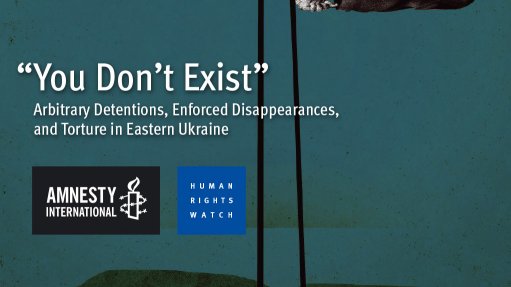
Both the Ukrainian government authorities and Russia-backed separatists in eastern Ukraine have held civilians in prolonged, arbitrary detention, without any contact with the outside world, including with their lawyers or families. In some cases, the detentions constituted enforced disappearances, meaning that the authorities in question refused to acknowledge the detention of the person or refused to provide any information on their whereabouts or fate. Most of those detained suffered torture or other forms of ill-treatment. Several were denied needed medical attention for the injuries they sustained in detention.
In cases documented by Amnesty International and Human Rights Watch, the Ukrainian authorities and pro-Kyiv paramilitary groups detained civilians suspected of involvement with or supporting Russia-backed separatists, while the separatist forces have detained civilians suspected of supporting or spying for the Ukrainian government. Vadim’s case stands out because, of all the people we interviewed, he was the only one who was held in secret detention and tortured first by one side, then the other.
Amnesty International and Human Rights Watch investigated in detail nine cases of arbitrary, prolonged detention of civilians by the Ukrainian authorities in informal detention sites and nine cases of arbitrary, prolonged detention of civilians by Russia-backed separatists. This report details cases that took place mostly in 2015 and the first half of 2016.
Persons held by the warring sides in eastern Ukraine are protected under international human rights and international humanitarian law, which unequivocally ban arbitrary detention, torture, and other ill-treatment. International standards provide that allegations of torture and other ill-treatment be investigated, and that, when the evidence warrants it, the perpetrators be prosecuted. Detainees must be provided with adequate food, water, clothing, shelter, and medical care.
In almost all of the eighteen cases investigated, release of the civilian detainees was at some point discussed by the relevant side in the context of prisoner exchanges. In nine out of the eighteen cases, they were in fact exchanged. This gives rise to serious concerns that both sides may be detaining civilians in order to have “currency” for potential exchange of prisoners.
It is difficult to estimate the total number of civilians who have been the victims of the kinds of abuses documented in this report. However, the Report on the human rights situation in Ukraine 16 February to 15 May 2016 published in June 2016 by the United Nations Office of the High Commissioner for Human Rights (OHCHR) stated that “arbitrary detention, torture and ill-treatment remain deeply entrenched practices” in the region, suggesting that these problems are more widespread than the limited number of cases investigated by Amnesty International and Human Rights Watch.
Report by Amnesty International and the Human Rights Watch